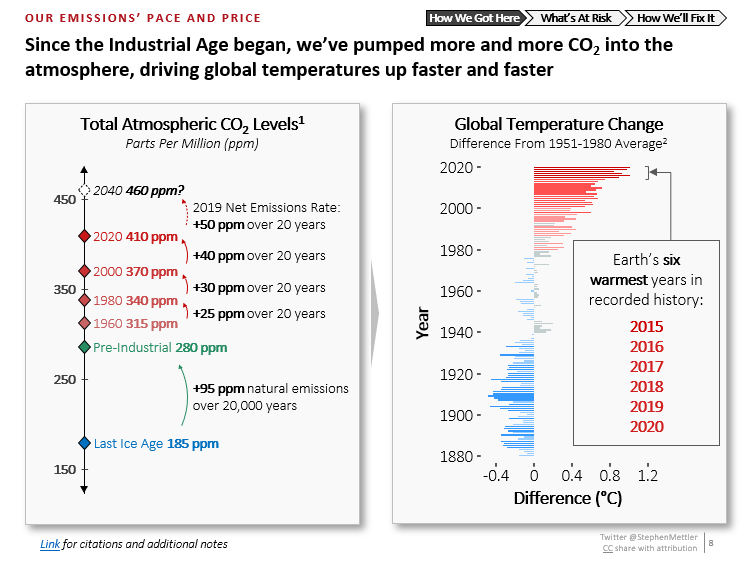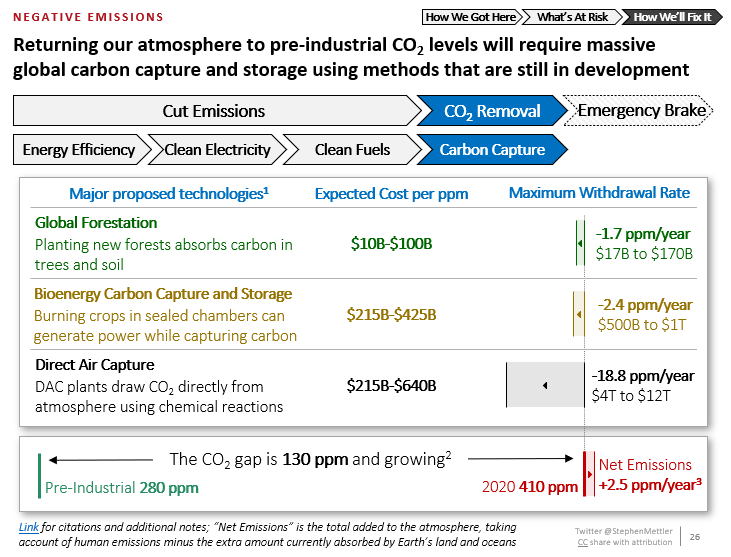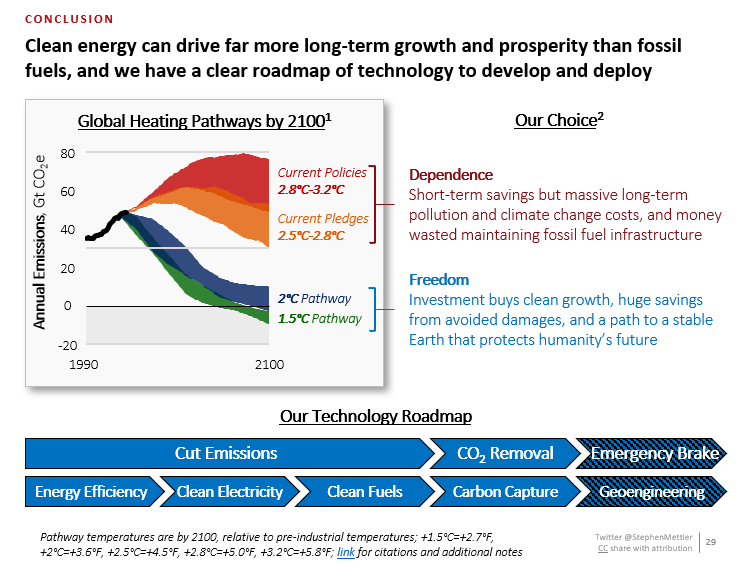'Freedom from Fossil Fuels' - a climate science framework for non-scientists
Posted on 11 March 2021 by Stephen Mettler, BaerbelW
A note from the Skeptical Science team:
Stephen Mettler recently contacted us about a slide deck he made which aims to help non-experts quickly build a foundation of climate science and clean technology knowledge. The deck can be downloaded here as a PDF (3 MB), PPTX presentation (10 MB), or viewed in a Youtube playlist with Stephen's narration.
This blog post is an account of his journey to creating the slide deck. Stephen graduated from Yale in 2018 with a degree in Global Affairs, and currently works at an aerospace-focused consulting firm. He is on Twitter at @StephenMettler.
We have invited Stephen to join our Skeptical Science team, so this blog post is his first as an SkS author. Welcome aboard!
An Amateur’s Journey into Climate Science
As more and more governments, companies, and citizens wake up to the threat of climate change, record numbers of non-experts are looking online for a quick, accessible introduction to climate science. Almost two years ago, I was one of them. As a recent college graduate with an international relations degree, I was at my job, researching new seawalls to protect coastal cities from rising oceans. I realized I had a gap in my understanding of the greenhouse effect: since IR light is emitted both from the sun and from Earth, I wondered why higher atmospheric carbon dioxide blocks more outgoing than incoming energy. I decided to look it up when I got back home, convinced the information couldn’t be that hard to find.
Video introduction of Stephen Mettler's presentation "Freedom from Fossil Fuels"
Almost two years later, I can confirm that it was. I found my answer over a few hours of frustration, but had found even more gaps in my understanding. This was the first of many cycles that drove me further and further into the maddeningly complex maze of online climate information. As a newcomer, I found some excellent sources written for beginners, but wished they had covered a broader scope. I wandered through countless false and misleading sources, some of which were subtle and well-written enough that I wrote them into my notes and only realized my mistake months later. Passionate newcomers eager to engage with climate science deserve a faster, easier way to build a foundation of climate knowledge. I believe scientists can help them by linking and expanding current resources.
The Maze of Mainstream Media
Like many newcomers to climate science, I began with mainstream news articles and blogs. I usually ended those early research sessions more confused than when I started. Even when these sources are accurate, they tend to focus on extreme events, major milestones, and new studies. They don’t deliver all the core scientific background required to place these updates into context. Meanwhile, I constantly ran into intentional disinformation and accidental misinformation. I knew to be prepared for climate denial sources arguing that climate isn’t warming, isn’t warming because of humans, or is warming but that isn’t a problem. However, I was deeply disappointed to find inaccuracy from the opposite side: sources that, hoping to spur rapid climate action, overstepped by presenting the most extreme climate forecasts as scientific consensus. This risks making readers feel misled, driving them into the arms of deniers, or hopeless, falling into fatalistic inaction. At times I was on the verge of both.
One way to address these challenges is to work with news sites to attach links to foundational climate background sources, like SciLine’s beginner-friendly fact sheets, every time they report on events linked to climate change. Journalists writing about extreme weather events shouldn’t have to start every article with a full explanation of the greenhouse effect and how heat affects weather patterns, but they should give readers links to that information. As readers get used to legitimate sources containing these links, they will also get better at spotting illegitimate sources that don’t have them.
Figure 1: Slide 8 of Freedom from Fossil Fuels (click for high-definition image)
Scientific Sources’ Missed Opportunities
As I researched further, I learned to rely on scientifically rigorous sources that cater to beginners like NOAA, Skeptical Science, and Our World in Data, but wished they would dig deeper. These sources understandably focus on key top-level points, walking beginners through a bird’s-eye overview of how human activity drives climate change. But as I read them, I wanted more. They have excellent analyses of historical data, but what do future warming pathways look like? They catalogue climate change damage, but what are estimates of how much a dollar spent on reducing emissions today will pay off in avoided costs in the future? They reference technologies that can decarbonize the global economy, but what specific investments in R&D and deployment could get us there fastest? To answer these questions I waded into academic papers, industry reports, and think tank research. I can confirm firsthand that these are not easy for an amateur to access and digest, especially while taking into account sources’ biases. Assembling all this information into a cohesive understanding of climate change takes much more effort than most people are willing to put in. That said, it could be much easier if scientists give their audience a boost.
Figure 2: Slide 26 of Freedom from Fossil Fuels (click for high-definition image)
I understand the case made by leaders like Tony Leiserowitz that, to make climate science accessible to the largest possible audience, scientists should focus on the most vital handful of top-level facts. However, I don’t believe I’m the only amateur who wants to dive in deeper to fully understand where climate change is heading, how it threatens us, and how we can address it. I’m proud that I’ve developed my own foundational understanding, but there were countless times when I almost gave up or wandered into disinformation. I don't know how many others like me have gotten lost wandering through this maze, but I know that at such a vital time for climate action, we need to offer a clearer path. Educational resources that start from first principles and use clear, concise, visual summaries may make the difference in pulling many more people like me from confusion to climate advocacy.
What we can do about it
Going through this research process was deeply frustrating, but also inspiring. Hoping to help people facing the same challenge I had, I decided to write the kind of source that I wish I’d been able to find at the beginning of my research. I created the attached slide deck, which builds a foundational framework of how climate change works, how it threatens us, and how we can address it. I believe documents like these, especially if referenced as background material by major news sources, can play a critical role in making accurate, compelling climate change information more accessible to all newcomers. You can download the deck or view a narrated version at the links in the green box below, and please feel free to reuse the slides in whole or in part! Feedback, suggestions, and new ideas are welcome in the comments.
Finally, thank you to the Skeptical Science team for publishing this work and welcoming me onboard! I'm really excited to keep working on bridging the climate information divide.
Figure 3: Slide 29 of Freedom from Fossil Fuels (click for high-definition image)
Note: The slide-deck "Freedom from Fossil Fuels" is available for download as a PDF (3 MB), PPTX presentation (10 MB) and in a playlist on YouTube with several videos with audio.































 Arguments
Arguments

































Thanks, Stephen! I'm a retired biochemist/molecular biologist, who was rigorously trained in physics, chemistry, and biology--but never in climate science. Like you, I am a climate science auto-didact. The fact that I had previous scientific training certainly gave me a leg up. Nevertheless, gaining a full understanding of the greenhouse effect, of the current climate crisis, and of possible solutions was not easy for me. So I congratulate you on your intelligent persistence, your willingness to share what you learned with others, and your creativity in generating a clear, scientifically based presentation!
I intend to share your presentation with many friends who have asked me to help them understand climate science. I would like to be able to respond quickly and fully to each such friend, but I would have to develop a presentation like yours before I could get started, and I haven't found the time to do so. Your presentation comes as a great time-saving gift to me and as a wish-come-true for my friends!
Thank you Joel, I really appreciate the kind feedback and I'm so glad this can be an easy on-ramp to welcome more people in!
I can now add that I've gone over the PDF version of your slide deck with a fine-tooth comb, looking for any errors of science or policy (based on my experience as a scientifically-trained but auto-didact climate scientist and as an activist with Citizens' Climate Lobby). Not only did I not find any errors, but I discovered new information of which I was previously unaware! Hearty congratulations and thanks to you!!
Thanks so much Joel! If you have any recommendations on follow-up areas to prioritize as well, it would be great to hear them - my current plan is to pivot now to building some much shorter posts on individual clean technology solution areas (e.g., more detail on carbon capture technologies, a deeper dive into clean fuels, especially focusing on types of hydrogen production, and ongoing debates over nuclear power).
Thank you so much Stephen ! I continually try to find words to describe climate change in a way that is easily understandable to people, especially the deniers, so I think you have cracked it ! I appreciate all the hard work it must have taken you to get to this point. Fantastic work. I look forward to your shorter versions ! Thanks again, from a climate activist